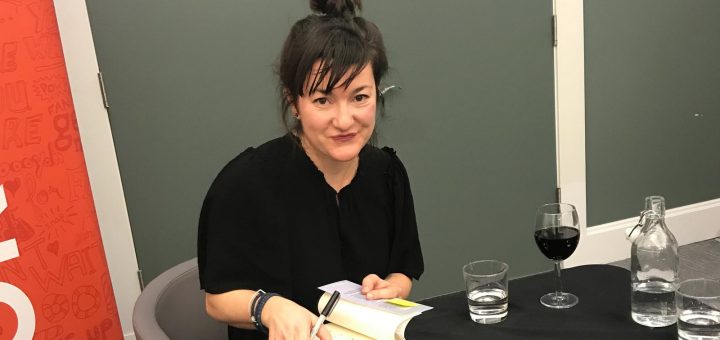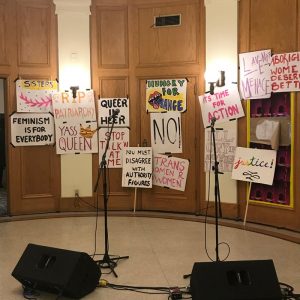Notes from a Feminist Killjoy

The Wordfest event perfect for International Women’s Day
By Sabrina Harmata, Staff Writer
Books. Feminism. Stimulating intellectual discussion. This Wordfest and Femme Wave event had it all. On March 8, Erin Wunker, author of Notes from a Feminist Killjoy, chair of the board of the national not-for-profit organization Canadian Women in Literary Arts, and co-founder, writer and editor of the blog Hook & Eye: Fast Feminism, Slow Academe, gave a talk concerning her first book at Memorial Park Library. Given the nature of her talk and how it brought attention to many feminist issues, it can be no coincidence that this event fell on International Women’s Day.
In her talk, Wunker admitted that her “book is not meant to be a finished product,” which is largely due to the way in which it was written. Unlike all her other writing for blog entries and academic papers, she was unable to devote large blocks of time to writing this book because she was pregnant and then had to deal with a newborn child all throughout the process. So, she started writing in “small, stolen moments of time.” As a result, her book became a collection of different chunks of writing. But this doesn’t make it any less cohesive. The book works as a record of a killjoy feminist’s thoughts and reflections on every-day experiences. A book like this could never have a finished product seeing as how individuals and their thoughts evolve and grow through these experiences.
Talking about her book as a whole, Wunker acknowledged that “[t]he place from which [she] speak[s] is so limited. It’s only the place from which [she] speak[s].” Accepting this, Wunker advocated for truly listening to others experiences, as this is the only way we will be able to grow. Along with this, she suggested directly confronting every-day issues of sexism, racism, ableism, homophobia and transphobia, because simply listening isn’t enough. Actions must be taken. Wunker agreed that this confrontation “is a skill. It is never comfortable, but it is necessary.” Hearing that even an active feminist such as Wunker was still uncomfortable in these situations made me feel a lot better about feeling the same way and showed me that this feeling didn’t make me a bad feminist.

The signs behind speakers at the March 8 WordFest and Femme Wave event, reading messages like “RIP Patriarchy.” Photo by Sabrina Harmata
Wunker even gave suggestions for lesser actions that we can take this year to honour Women’s Day. As some of you may have heard, we are getting new $10 bills, featuring Viola Desmond, a woman who advocated for black rights in Nova Scotia in 1946. Although these bills won’t be in circulation until closer to the end of the year, Wunker recommended we all donate our first Viola Desmond to a women’s charity. Obviously, this isn’t possible for everyone, but if, when you receive your first new $10 bill, you have the financial stability to donate it, this would be a great way to support women.
Of the whole event, the Q&A at the end was most informative, in part because of the insightful questions people asked. The first of these being: how is the practice of feminism online different than in real life? Wunker credited the internet with being the place where she learned most about other people’s experiences because of the quick and easy access to people’s opinions. This access gave her the ability to “educate [herself] about certain thing [she] might not have known.” Using the internet isn’t essential to being a feminist, but it definitely has resources for people to learn how to be better ones.
Another question led to a discussion on different coping mechanisms for public forms of criticism. Wunker mentioned the significance of finding support for mental health even in times when you aren’t in a crisis situation. When a situation does arise, Wunker stressed the usefulness of talking with friends and asking for help. The most important suggestion Wunker gave was to “realize it might be the first time, but it won’t be the last.” This realization will ultimately give us the strength to keep fighting for what is right.
The best question of the night was: how do you question more conservative people in their own spaces? Wunker’s advice was to ask them to question their own resistance in a polite way that encourages them to respond. People generally don’t respond well to accusing questions or going on the defensive. According to Wunker, the best thing to do is to simply say, “you seem a bit threatened by this, why do you think that is?” or “what makes you want to refuse this so quickly?” This way, the focus isn’t on accusing them, but on educating them.
Before this, I had never gone to a Wordfest event. I didn’t know what to expect, but I definitely didn’t expect to enjoy it so much. Instead of being focused on Wunker and her book, we also had a safe place to discuss feminist politics as a whole. Overall, it wasn’t only educational but fun, too. Next time you see a poster for a Wordfest event, I recommend going even if you haven’t read the book or heard of the author. The conversations alone are worth it.




